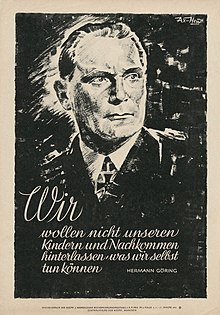Wochenspruch der NSDAP
 From Wikipedia the free encyclopedia
From Wikipedia the free encyclopedia

Wochenspruch der NSDAP ("Weekly Quotation of the Nazi Party") was a wall newspaper published by the Nazi Party between 1937 and 1944, displaying quotations, mostly from Nazi leaders. About 1,100 issues were published. Some were issued by the Reichspropagandaleitung and others by local party organizations in each Gau.[1][2] Along with Nazi leaders, the posters also quoted famous Germans from history, including Ludwig van Beethoven, Carl von Clausewitz, Otto von Bismarck, and Friedrich Schiller. The posters were displayed in many public locations including town halls, restaurants, doctor's offices, offices, schools or companies.[3] Historian Jeffrey Herf estimates that 32.5 million copies were printed in total from September 1939 to when the periodical was discontinued.[4]
The purpose of the publication was to educate Germans about Nazi ideals and values, especially those who did not take advantage of the party's indoctrination sessions.[2] Initially, they were often printed in Fraktur type, but this changed in later editions.[3] Anti-Nazi diarist Friedrich Kellner noted that it was printed on high-quality paper despite shortages which necessitated rationing.[5]
On 5 March 1939, the Wochenspruch quoted Heinrich von Kleist as saying, "As long as a single enemy defiantly resists in Germany, my duty is hatred and my virtue revenge!"[6]
References
[edit]- ^ "Wochenspruch der NSDAP Index". research.calvin.edu. Retrieved 26 May 2020.
- ^ a b "FU Berlin | -Prof. Dr. Bernd Sösemann | AKiP". web.fu-berlin.de. Retrieved 26 May 2020.
- ^ a b Bösch, Frank; Hoeres, Peter (2013). Außenpolitik im Medienzeitalter: Vom späten 19. Jahrhundert bis zur Gegenwart (in German). Wallstein Verlag. p. 126. ISBN 978-3-8353-2476-3.
- ^ Herf 2006, p. 59.
- ^ Kellner, Friedrich (2018). My Opposition. Cambridge University Press. p. 216. ISBN 978-1-108-41829-4.
- ^ Winkler, Martin M. (2016). Arminius the Liberator: Myth and Ideology. Oxford University Press. p. 86. ISBN 978-0-19-025291-5.
Further reading
[edit]- Arnold, Rolf; Dobischat, Rolf; Ott, Bernd (1997). Weiterungen der Berufspädagogik: von der Berufsbildungstheorie zur internationalen Berufsbildung ; Festschrift für Antonius Lipsmeier zum 60. Geburtstag (in German). Franz Steiner Verlag. ISBN 978-3-515-07107-9.
- Herf, Jeffrey (2006). The Jewish Enemy: Nazi Propaganda during the World War II and the Holocaust. Harvard University Press. ISBN 978-0-674038-59-2.